Biography of Charles Bates and Australian Culture History, 1901
VerifiedAdded on 2023/06/10
|8
|1849
|262
Project
AI Summary
This assignment is a biographical account of Charles Bates, a journalist born in Melbourne in 1899, during the era of Australian Federation. The biography details his life, education, and career, highlighting his move to Sydney, his work as a journalist, and his contributions to the field. The report discusses the social and working conditions of the time, including the low wages, gender disparities, and the expectation of children to work. Bates's focus on journalistic ethics, his support for the federation movement, and his dedication to his nation are emphasized. The biography also covers his family life, his marriage, and his eventual death in 1961, leaving behind a legacy of journalistic integrity and service to Australia. The report uses various sources to provide a comprehensive understanding of Charles Bates's life and impact on Australian culture and history. The biography also highlights his strong views on public matters and his contributions towards the federation council and his contribution to the betterment of the nation.
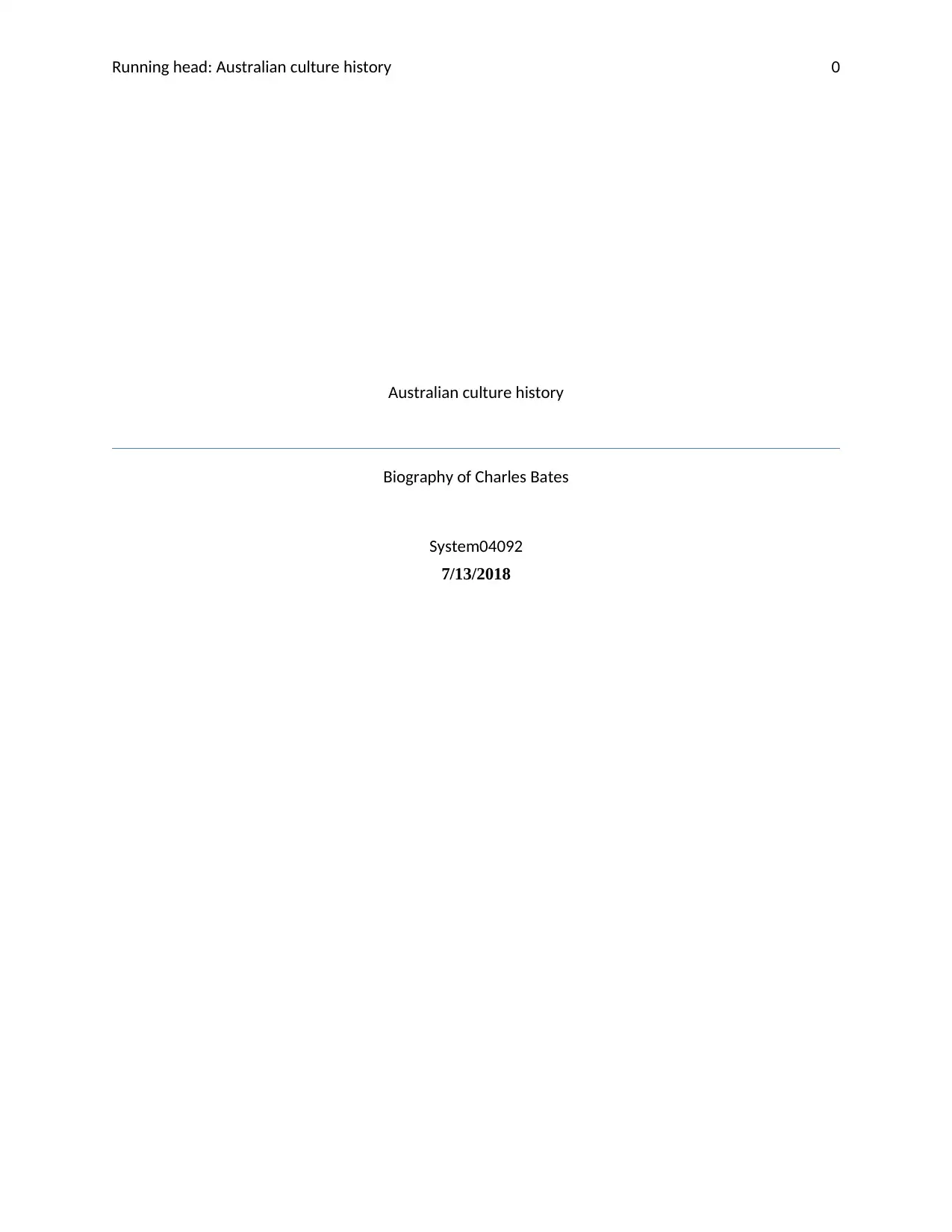
Running head: Australian culture history 0
Australian culture history
Biography of Charles Bates
System04092
7/13/2018
Australian culture history
Biography of Charles Bates
System04092
7/13/2018
Paraphrase This Document
Need a fresh take? Get an instant paraphrase of this document with our AI Paraphraser
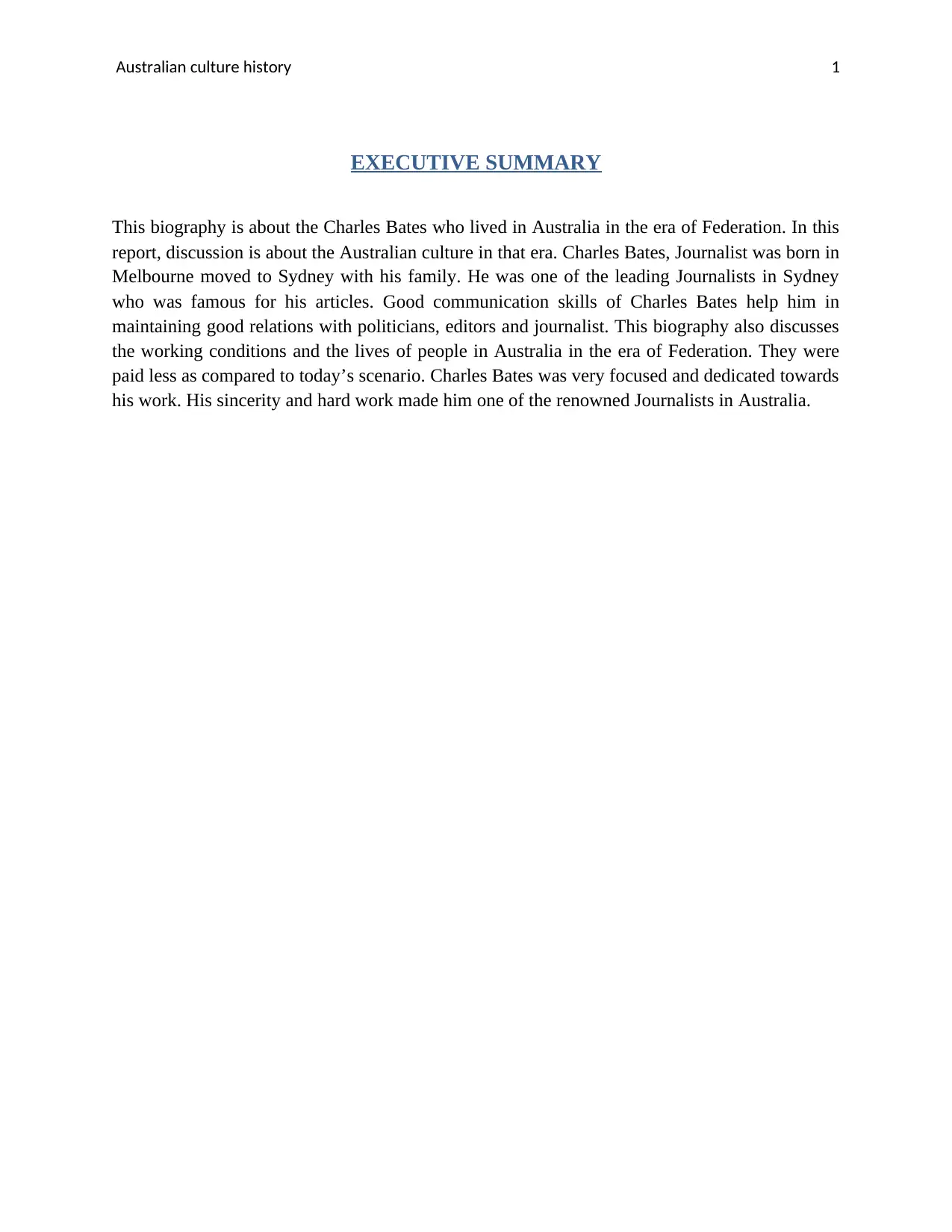
Australian culture history 1
EXECUTIVE SUMMARY
This biography is about the Charles Bates who lived in Australia in the era of Federation. In this
report, discussion is about the Australian culture in that era. Charles Bates, Journalist was born in
Melbourne moved to Sydney with his family. He was one of the leading Journalists in Sydney
who was famous for his articles. Good communication skills of Charles Bates help him in
maintaining good relations with politicians, editors and journalist. This biography also discusses
the working conditions and the lives of people in Australia in the era of Federation. They were
paid less as compared to today’s scenario. Charles Bates was very focused and dedicated towards
his work. His sincerity and hard work made him one of the renowned Journalists in Australia.
EXECUTIVE SUMMARY
This biography is about the Charles Bates who lived in Australia in the era of Federation. In this
report, discussion is about the Australian culture in that era. Charles Bates, Journalist was born in
Melbourne moved to Sydney with his family. He was one of the leading Journalists in Sydney
who was famous for his articles. Good communication skills of Charles Bates help him in
maintaining good relations with politicians, editors and journalist. This biography also discusses
the working conditions and the lives of people in Australia in the era of Federation. They were
paid less as compared to today’s scenario. Charles Bates was very focused and dedicated towards
his work. His sincerity and hard work made him one of the renowned Journalists in Australia.
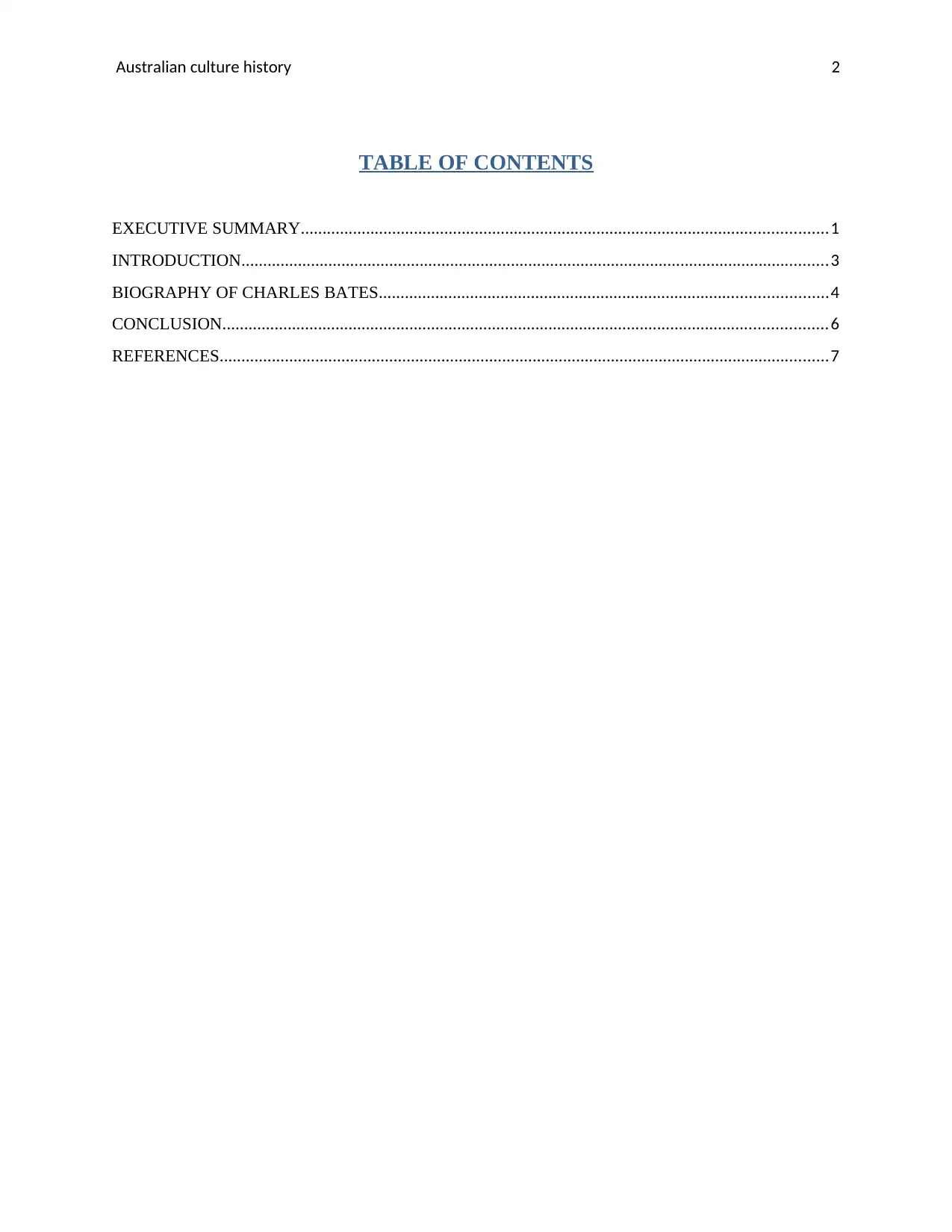
Australian culture history 2
TABLE OF CONTENTS
EXECUTIVE SUMMARY.........................................................................................................................1
INTRODUCTION.......................................................................................................................................3
BIOGRAPHY OF CHARLES BATES.......................................................................................................4
CONCLUSION...........................................................................................................................................6
REFERENCES............................................................................................................................................7
TABLE OF CONTENTS
EXECUTIVE SUMMARY.........................................................................................................................1
INTRODUCTION.......................................................................................................................................3
BIOGRAPHY OF CHARLES BATES.......................................................................................................4
CONCLUSION...........................................................................................................................................6
REFERENCES............................................................................................................................................7
⊘ This is a preview!⊘
Do you want full access?
Subscribe today to unlock all pages.

Trusted by 1+ million students worldwide
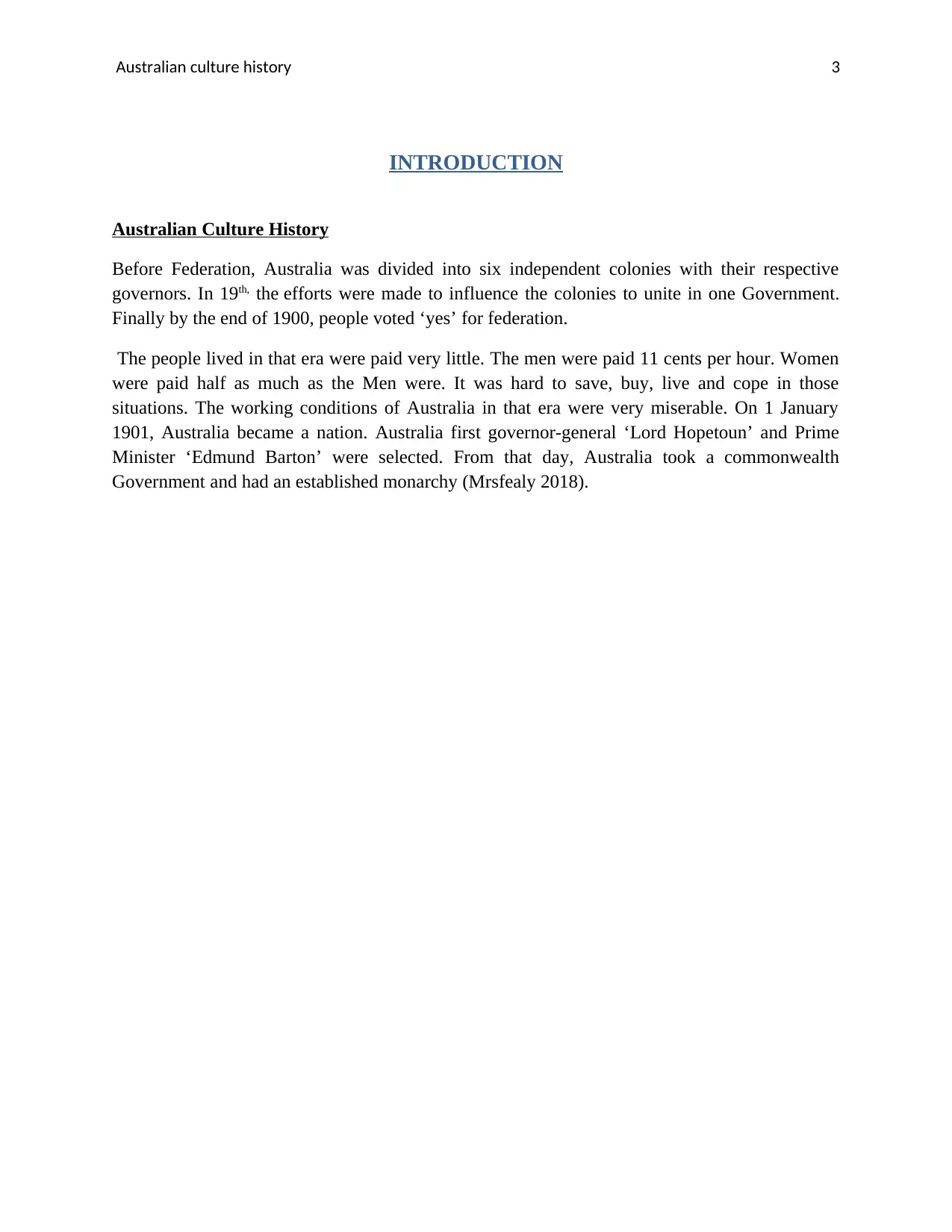
Australian culture history 3
INTRODUCTION
Australian Culture History
Before Federation, Australia was divided into six independent colonies with their respective
governors. In 19th, the efforts were made to influence the colonies to unite in one Government.
Finally by the end of 1900, people voted ‘yes’ for federation.
The people lived in that era were paid very little. The men were paid 11 cents per hour. Women
were paid half as much as the Men were. It was hard to save, buy, live and cope in those
situations. The working conditions of Australia in that era were very miserable. On 1 January
1901, Australia became a nation. Australia first governor-general ‘Lord Hopetoun’ and Prime
Minister ‘Edmund Barton’ were selected. From that day, Australia took a commonwealth
Government and had an established monarchy (Mrsfealy 2018).
INTRODUCTION
Australian Culture History
Before Federation, Australia was divided into six independent colonies with their respective
governors. In 19th, the efforts were made to influence the colonies to unite in one Government.
Finally by the end of 1900, people voted ‘yes’ for federation.
The people lived in that era were paid very little. The men were paid 11 cents per hour. Women
were paid half as much as the Men were. It was hard to save, buy, live and cope in those
situations. The working conditions of Australia in that era were very miserable. On 1 January
1901, Australia became a nation. Australia first governor-general ‘Lord Hopetoun’ and Prime
Minister ‘Edmund Barton’ were selected. From that day, Australia took a commonwealth
Government and had an established monarchy (Mrsfealy 2018).
Paraphrase This Document
Need a fresh take? Get an instant paraphrase of this document with our AI Paraphraser
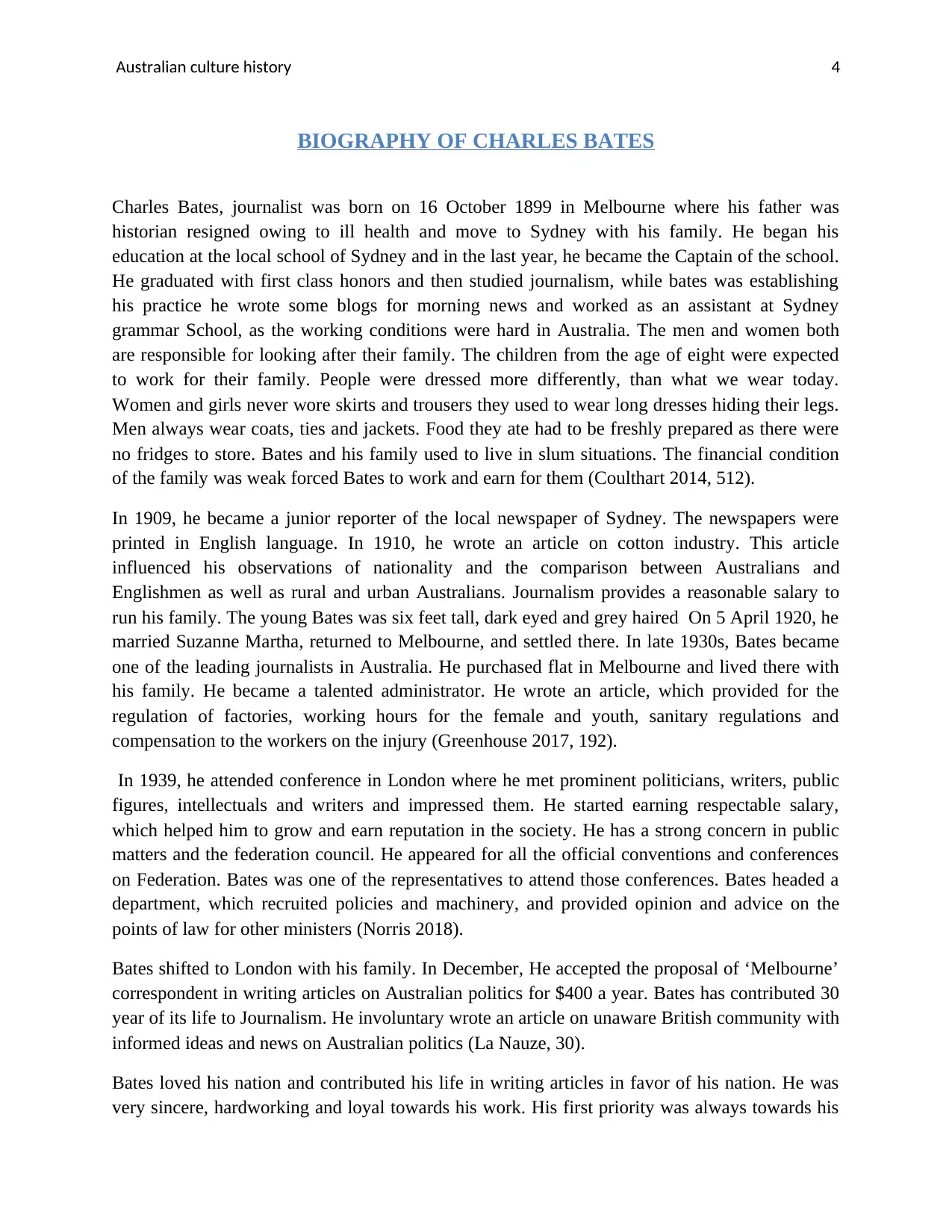
Australian culture history 4
BIOGRAPHY OF CHARLES BATES
Charles Bates, journalist was born on 16 October 1899 in Melbourne where his father was
historian resigned owing to ill health and move to Sydney with his family. He began his
education at the local school of Sydney and in the last year, he became the Captain of the school.
He graduated with first class honors and then studied journalism, while bates was establishing
his practice he wrote some blogs for morning news and worked as an assistant at Sydney
grammar School, as the working conditions were hard in Australia. The men and women both
are responsible for looking after their family. The children from the age of eight were expected
to work for their family. People were dressed more differently, than what we wear today.
Women and girls never wore skirts and trousers they used to wear long dresses hiding their legs.
Men always wear coats, ties and jackets. Food they ate had to be freshly prepared as there were
no fridges to store. Bates and his family used to live in slum situations. The financial condition
of the family was weak forced Bates to work and earn for them (Coulthart 2014, 512).
In 1909, he became a junior reporter of the local newspaper of Sydney. The newspapers were
printed in English language. In 1910, he wrote an article on cotton industry. This article
influenced his observations of nationality and the comparison between Australians and
Englishmen as well as rural and urban Australians. Journalism provides a reasonable salary to
run his family. The young Bates was six feet tall, dark eyed and grey haired On 5 April 1920, he
married Suzanne Martha, returned to Melbourne, and settled there. In late 1930s, Bates became
one of the leading journalists in Australia. He purchased flat in Melbourne and lived there with
his family. He became a talented administrator. He wrote an article, which provided for the
regulation of factories, working hours for the female and youth, sanitary regulations and
compensation to the workers on the injury (Greenhouse 2017, 192).
In 1939, he attended conference in London where he met prominent politicians, writers, public
figures, intellectuals and writers and impressed them. He started earning respectable salary,
which helped him to grow and earn reputation in the society. He has a strong concern in public
matters and the federation council. He appeared for all the official conventions and conferences
on Federation. Bates was one of the representatives to attend those conferences. Bates headed a
department, which recruited policies and machinery, and provided opinion and advice on the
points of law for other ministers (Norris 2018).
Bates shifted to London with his family. In December, He accepted the proposal of ‘Melbourne’
correspondent in writing articles on Australian politics for $400 a year. Bates has contributed 30
year of its life to Journalism. He involuntary wrote an article on unaware British community with
informed ideas and news on Australian politics (La Nauze, 30).
Bates loved his nation and contributed his life in writing articles in favor of his nation. He was
very sincere, hardworking and loyal towards his work. His first priority was always towards his
BIOGRAPHY OF CHARLES BATES
Charles Bates, journalist was born on 16 October 1899 in Melbourne where his father was
historian resigned owing to ill health and move to Sydney with his family. He began his
education at the local school of Sydney and in the last year, he became the Captain of the school.
He graduated with first class honors and then studied journalism, while bates was establishing
his practice he wrote some blogs for morning news and worked as an assistant at Sydney
grammar School, as the working conditions were hard in Australia. The men and women both
are responsible for looking after their family. The children from the age of eight were expected
to work for their family. People were dressed more differently, than what we wear today.
Women and girls never wore skirts and trousers they used to wear long dresses hiding their legs.
Men always wear coats, ties and jackets. Food they ate had to be freshly prepared as there were
no fridges to store. Bates and his family used to live in slum situations. The financial condition
of the family was weak forced Bates to work and earn for them (Coulthart 2014, 512).
In 1909, he became a junior reporter of the local newspaper of Sydney. The newspapers were
printed in English language. In 1910, he wrote an article on cotton industry. This article
influenced his observations of nationality and the comparison between Australians and
Englishmen as well as rural and urban Australians. Journalism provides a reasonable salary to
run his family. The young Bates was six feet tall, dark eyed and grey haired On 5 April 1920, he
married Suzanne Martha, returned to Melbourne, and settled there. In late 1930s, Bates became
one of the leading journalists in Australia. He purchased flat in Melbourne and lived there with
his family. He became a talented administrator. He wrote an article, which provided for the
regulation of factories, working hours for the female and youth, sanitary regulations and
compensation to the workers on the injury (Greenhouse 2017, 192).
In 1939, he attended conference in London where he met prominent politicians, writers, public
figures, intellectuals and writers and impressed them. He started earning respectable salary,
which helped him to grow and earn reputation in the society. He has a strong concern in public
matters and the federation council. He appeared for all the official conventions and conferences
on Federation. Bates was one of the representatives to attend those conferences. Bates headed a
department, which recruited policies and machinery, and provided opinion and advice on the
points of law for other ministers (Norris 2018).
Bates shifted to London with his family. In December, He accepted the proposal of ‘Melbourne’
correspondent in writing articles on Australian politics for $400 a year. Bates has contributed 30
year of its life to Journalism. He involuntary wrote an article on unaware British community with
informed ideas and news on Australian politics (La Nauze, 30).
Bates loved his nation and contributed his life in writing articles in favor of his nation. He was
very sincere, hardworking and loyal towards his work. His first priority was always towards his
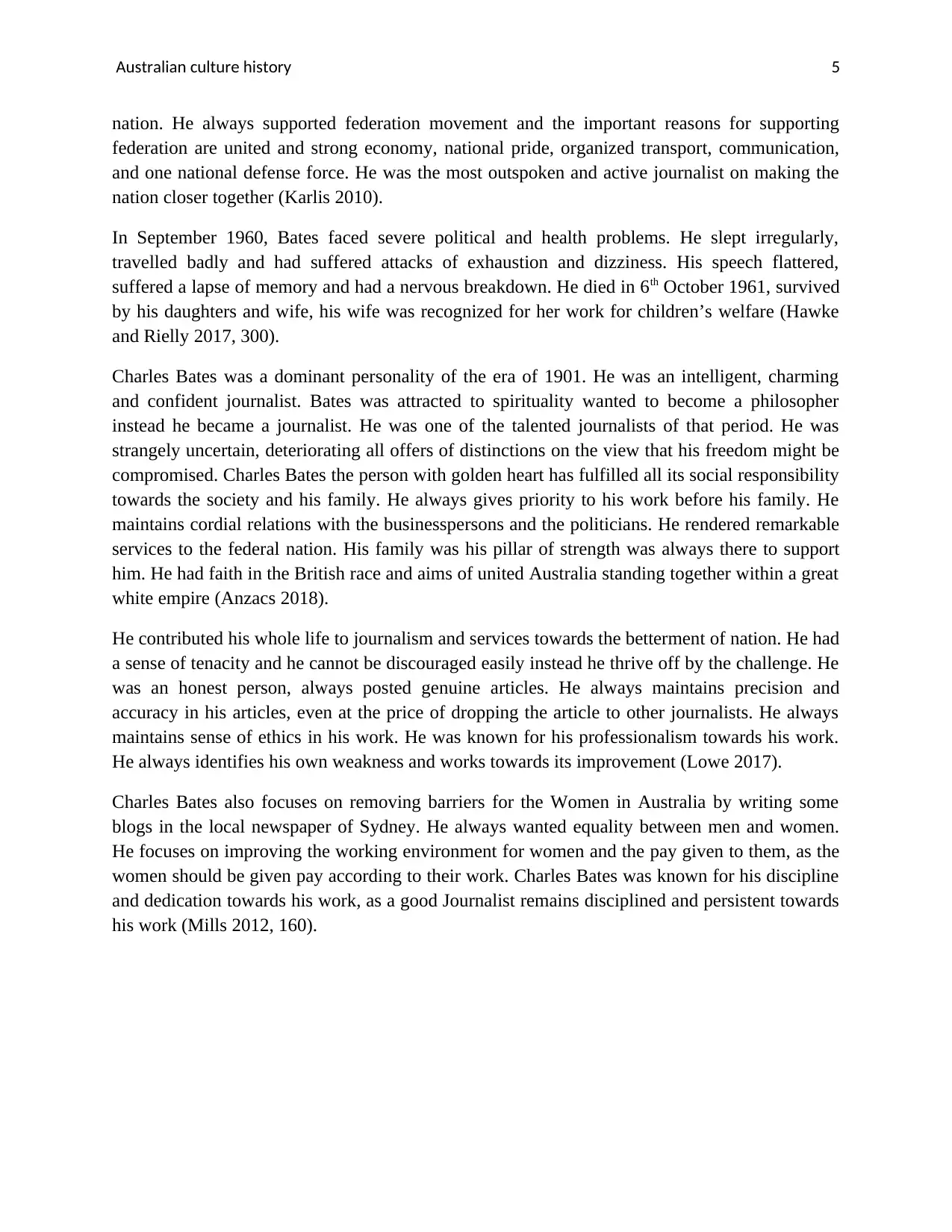
Australian culture history 5
nation. He always supported federation movement and the important reasons for supporting
federation are united and strong economy, national pride, organized transport, communication,
and one national defense force. He was the most outspoken and active journalist on making the
nation closer together (Karlis 2010).
In September 1960, Bates faced severe political and health problems. He slept irregularly,
travelled badly and had suffered attacks of exhaustion and dizziness. His speech flattered,
suffered a lapse of memory and had a nervous breakdown. He died in 6th October 1961, survived
by his daughters and wife, his wife was recognized for her work for children’s welfare (Hawke
and Rielly 2017, 300).
Charles Bates was a dominant personality of the era of 1901. He was an intelligent, charming
and confident journalist. Bates was attracted to spirituality wanted to become a philosopher
instead he became a journalist. He was one of the talented journalists of that period. He was
strangely uncertain, deteriorating all offers of distinctions on the view that his freedom might be
compromised. Charles Bates the person with golden heart has fulfilled all its social responsibility
towards the society and his family. He always gives priority to his work before his family. He
maintains cordial relations with the businesspersons and the politicians. He rendered remarkable
services to the federal nation. His family was his pillar of strength was always there to support
him. He had faith in the British race and aims of united Australia standing together within a great
white empire (Anzacs 2018).
He contributed his whole life to journalism and services towards the betterment of nation. He had
a sense of tenacity and he cannot be discouraged easily instead he thrive off by the challenge. He
was an honest person, always posted genuine articles. He always maintains precision and
accuracy in his articles, even at the price of dropping the article to other journalists. He always
maintains sense of ethics in his work. He was known for his professionalism towards his work.
He always identifies his own weakness and works towards its improvement (Lowe 2017).
Charles Bates also focuses on removing barriers for the Women in Australia by writing some
blogs in the local newspaper of Sydney. He always wanted equality between men and women.
He focuses on improving the working environment for women and the pay given to them, as the
women should be given pay according to their work. Charles Bates was known for his discipline
and dedication towards his work, as a good Journalist remains disciplined and persistent towards
his work (Mills 2012, 160).
nation. He always supported federation movement and the important reasons for supporting
federation are united and strong economy, national pride, organized transport, communication,
and one national defense force. He was the most outspoken and active journalist on making the
nation closer together (Karlis 2010).
In September 1960, Bates faced severe political and health problems. He slept irregularly,
travelled badly and had suffered attacks of exhaustion and dizziness. His speech flattered,
suffered a lapse of memory and had a nervous breakdown. He died in 6th October 1961, survived
by his daughters and wife, his wife was recognized for her work for children’s welfare (Hawke
and Rielly 2017, 300).
Charles Bates was a dominant personality of the era of 1901. He was an intelligent, charming
and confident journalist. Bates was attracted to spirituality wanted to become a philosopher
instead he became a journalist. He was one of the talented journalists of that period. He was
strangely uncertain, deteriorating all offers of distinctions on the view that his freedom might be
compromised. Charles Bates the person with golden heart has fulfilled all its social responsibility
towards the society and his family. He always gives priority to his work before his family. He
maintains cordial relations with the businesspersons and the politicians. He rendered remarkable
services to the federal nation. His family was his pillar of strength was always there to support
him. He had faith in the British race and aims of united Australia standing together within a great
white empire (Anzacs 2018).
He contributed his whole life to journalism and services towards the betterment of nation. He had
a sense of tenacity and he cannot be discouraged easily instead he thrive off by the challenge. He
was an honest person, always posted genuine articles. He always maintains precision and
accuracy in his articles, even at the price of dropping the article to other journalists. He always
maintains sense of ethics in his work. He was known for his professionalism towards his work.
He always identifies his own weakness and works towards its improvement (Lowe 2017).
Charles Bates also focuses on removing barriers for the Women in Australia by writing some
blogs in the local newspaper of Sydney. He always wanted equality between men and women.
He focuses on improving the working environment for women and the pay given to them, as the
women should be given pay according to their work. Charles Bates was known for his discipline
and dedication towards his work, as a good Journalist remains disciplined and persistent towards
his work (Mills 2012, 160).
⊘ This is a preview!⊘
Do you want full access?
Subscribe today to unlock all pages.

Trusted by 1+ million students worldwide
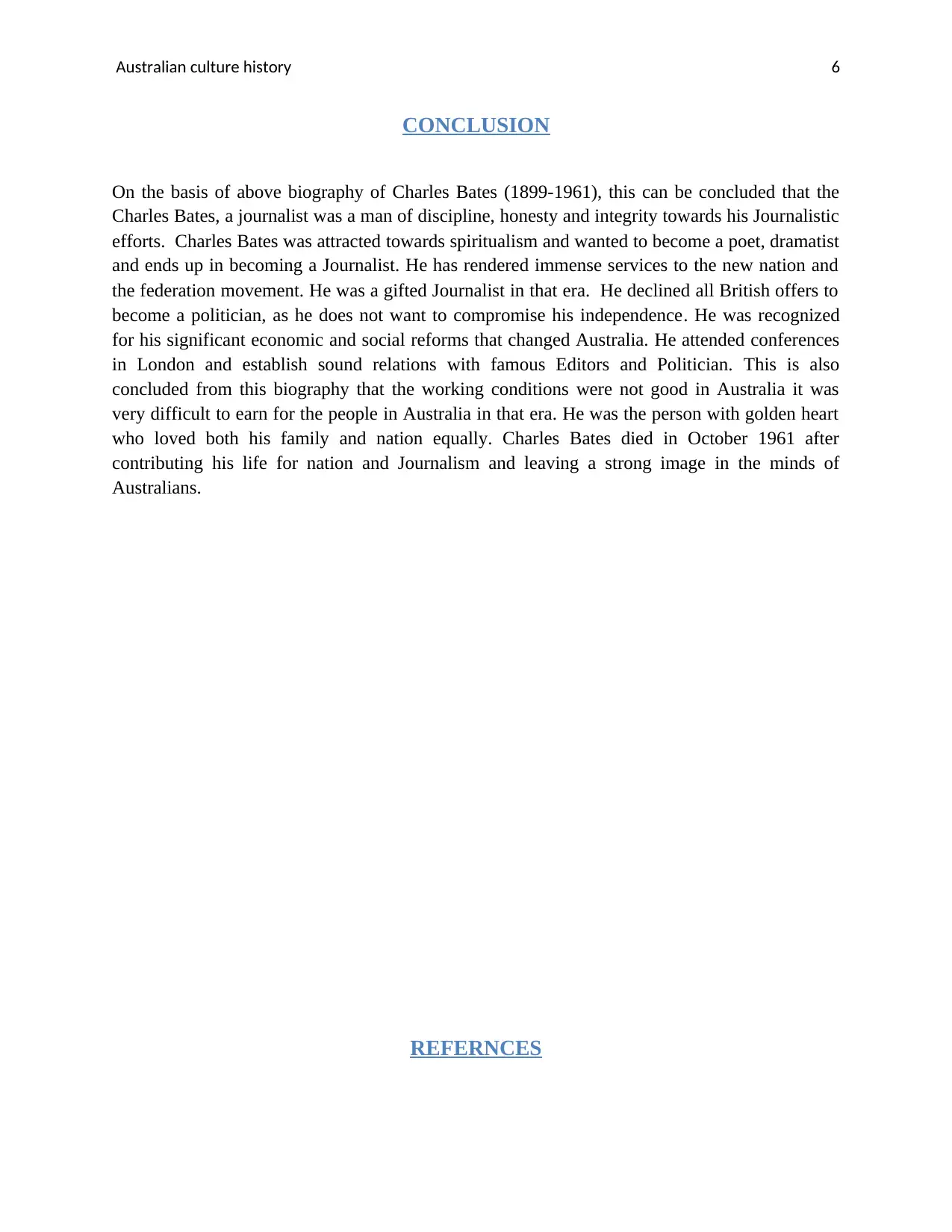
Australian culture history 6
CONCLUSION
On the basis of above biography of Charles Bates (1899-1961), this can be concluded that the
Charles Bates, a journalist was a man of discipline, honesty and integrity towards his Journalistic
efforts. Charles Bates was attracted towards spiritualism and wanted to become a poet, dramatist
and ends up in becoming a Journalist. He has rendered immense services to the new nation and
the federation movement. He was a gifted Journalist in that era. He declined all British offers to
become a politician, as he does not want to compromise his independence. He was recognized
for his significant economic and social reforms that changed Australia. He attended conferences
in London and establish sound relations with famous Editors and Politician. This is also
concluded from this biography that the working conditions were not good in Australia it was
very difficult to earn for the people in Australia in that era. He was the person with golden heart
who loved both his family and nation equally. Charles Bates died in October 1961 after
contributing his life for nation and Journalism and leaving a strong image in the minds of
Australians.
REFERNCES
CONCLUSION
On the basis of above biography of Charles Bates (1899-1961), this can be concluded that the
Charles Bates, a journalist was a man of discipline, honesty and integrity towards his Journalistic
efforts. Charles Bates was attracted towards spiritualism and wanted to become a poet, dramatist
and ends up in becoming a Journalist. He has rendered immense services to the new nation and
the federation movement. He was a gifted Journalist in that era. He declined all British offers to
become a politician, as he does not want to compromise his independence. He was recognized
for his significant economic and social reforms that changed Australia. He attended conferences
in London and establish sound relations with famous Editors and Politician. This is also
concluded from this biography that the working conditions were not good in Australia it was
very difficult to earn for the people in Australia in that era. He was the person with golden heart
who loved both his family and nation equally. Charles Bates died in October 1961 after
contributing his life for nation and Journalism and leaving a strong image in the minds of
Australians.
REFERNCES
Paraphrase This Document
Need a fresh take? Get an instant paraphrase of this document with our AI Paraphraser
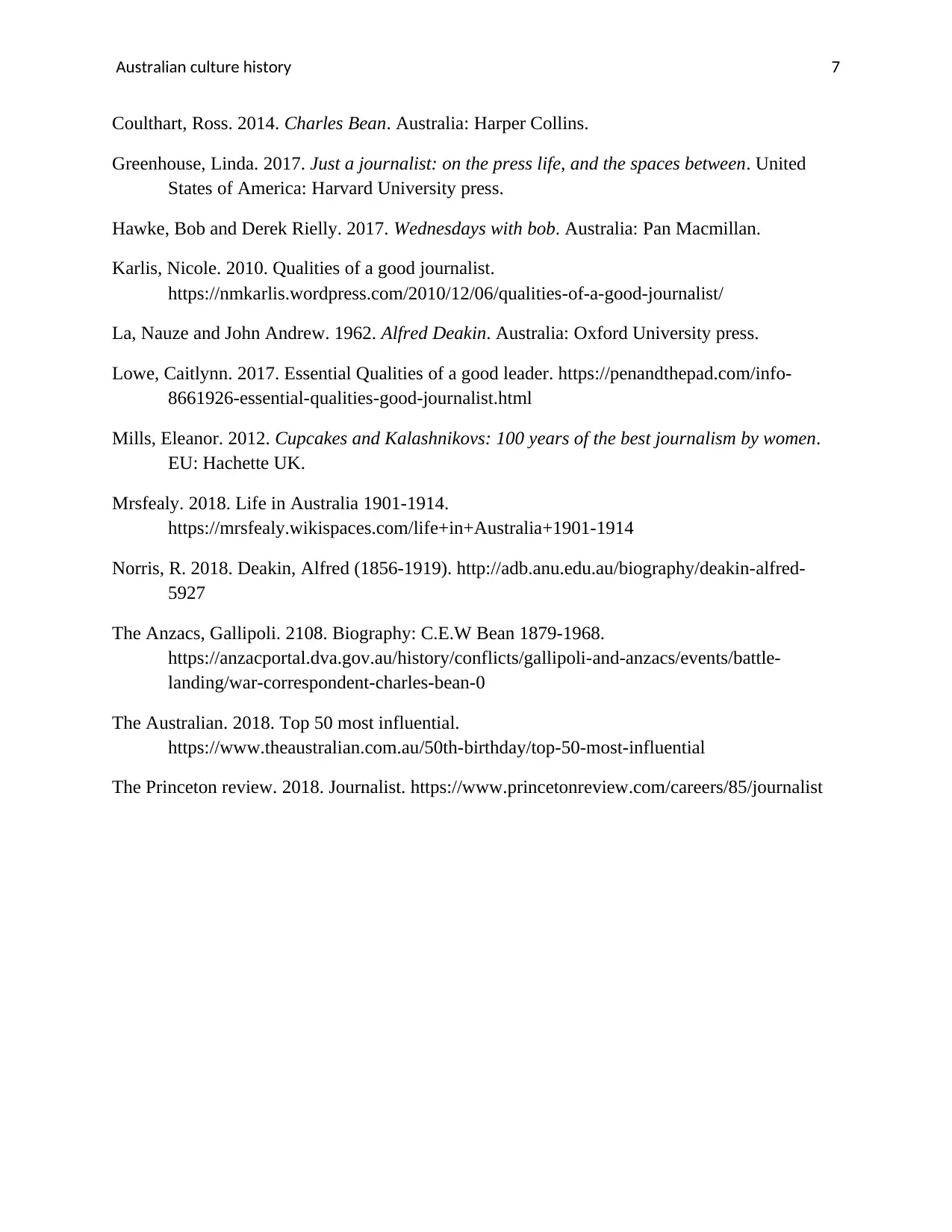
Australian culture history 7
Coulthart, Ross. 2014. Charles Bean. Australia: Harper Collins.
Greenhouse, Linda. 2017. Just a journalist: on the press life, and the spaces between. United
States of America: Harvard University press.
Hawke, Bob and Derek Rielly. 2017. Wednesdays with bob. Australia: Pan Macmillan.
Karlis, Nicole. 2010. Qualities of a good journalist.
https://nmkarlis.wordpress.com/2010/12/06/qualities-of-a-good-journalist/
La, Nauze and John Andrew. 1962. Alfred Deakin. Australia: Oxford University press.
Lowe, Caitlynn. 2017. Essential Qualities of a good leader. https://penandthepad.com/info-
8661926-essential-qualities-good-journalist.html
Mills, Eleanor. 2012. Cupcakes and Kalashnikovs: 100 years of the best journalism by women.
EU: Hachette UK.
Mrsfealy. 2018. Life in Australia 1901-1914.
https://mrsfealy.wikispaces.com/life+in+Australia+1901-1914
Norris, R. 2018. Deakin, Alfred (1856-1919). http://adb.anu.edu.au/biography/deakin-alfred-
5927
The Anzacs, Gallipoli. 2108. Biography: C.E.W Bean 1879-1968.
https://anzacportal.dva.gov.au/history/conflicts/gallipoli-and-anzacs/events/battle-
landing/war-correspondent-charles-bean-0
The Australian. 2018. Top 50 most influential.
https://www.theaustralian.com.au/50th-birthday/top-50-most-influential
The Princeton review. 2018. Journalist. https://www.princetonreview.com/careers/85/journalist
Coulthart, Ross. 2014. Charles Bean. Australia: Harper Collins.
Greenhouse, Linda. 2017. Just a journalist: on the press life, and the spaces between. United
States of America: Harvard University press.
Hawke, Bob and Derek Rielly. 2017. Wednesdays with bob. Australia: Pan Macmillan.
Karlis, Nicole. 2010. Qualities of a good journalist.
https://nmkarlis.wordpress.com/2010/12/06/qualities-of-a-good-journalist/
La, Nauze and John Andrew. 1962. Alfred Deakin. Australia: Oxford University press.
Lowe, Caitlynn. 2017. Essential Qualities of a good leader. https://penandthepad.com/info-
8661926-essential-qualities-good-journalist.html
Mills, Eleanor. 2012. Cupcakes and Kalashnikovs: 100 years of the best journalism by women.
EU: Hachette UK.
Mrsfealy. 2018. Life in Australia 1901-1914.
https://mrsfealy.wikispaces.com/life+in+Australia+1901-1914
Norris, R. 2018. Deakin, Alfred (1856-1919). http://adb.anu.edu.au/biography/deakin-alfred-
5927
The Anzacs, Gallipoli. 2108. Biography: C.E.W Bean 1879-1968.
https://anzacportal.dva.gov.au/history/conflicts/gallipoli-and-anzacs/events/battle-
landing/war-correspondent-charles-bean-0
The Australian. 2018. Top 50 most influential.
https://www.theaustralian.com.au/50th-birthday/top-50-most-influential
The Princeton review. 2018. Journalist. https://www.princetonreview.com/careers/85/journalist
1 out of 8
Your All-in-One AI-Powered Toolkit for Academic Success.
+13062052269
info@desklib.com
Available 24*7 on WhatsApp / Email
![[object Object]](/_next/static/media/star-bottom.7253800d.svg)
Unlock your academic potential
Copyright © 2020–2026 A2Z Services. All Rights Reserved. Developed and managed by ZUCOL.

